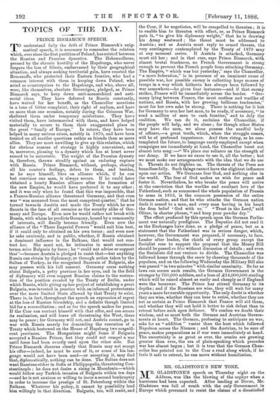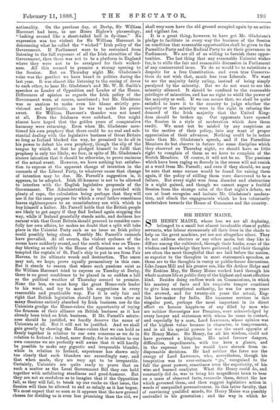MR. GLADSTONE'S NEW TONE.
MR. GLADSTONE'S speech on Thursday night on the Address, was like the blowing of the zephyr when a hurricane had been expected. After landing at Dover, Mr. Gladstone was full of wrath with the only Government in Europe which presumed to resist the claims of a dissatisfied
nationality. On the previous day, at Derby, Sir William Harcourt had been, to use Hosea Biglow's phraseology, "lashing around like a short-tailed bull in fly-time." No expression was too violent for Sir William Harcourt in denouncing what he called the "wicked" Irish policy of the Government. If Parliament were to be restrained from listening to the full exposure of all the Irish atrocities of the Government, then there was not to be a platform in England where they were not to be arraigned for their wicked- ness. All this seemed to promise a stormy opening to the Session. But on Thursday night Mr. Gladstone's voice was the gentlest we have heard in politics during the last year. It was almost like listening to the cooing of doves to each other, to hear Mr. Gladstone's and Mr. W. H. Smith's speeches as Leader of Opposition and Leader of the House. Differences of opinion as regards the Irish policy of the Government were, of course, mentioned ; but Mr. Gladstone was as anxious to make even his blame strictly pro- visional and hypothetic, as he was to make his praise
sweet. Sir William Harcourt's thunder was not heard at all. Even the Irishmen were subdued. One might almost have hoped that the golden years of comparative harmony were returning. Even when Mr. Gladstone men- tioned his own prophecy that there could be no real and sub- stantial dealing with the legislative business of Great Britain so long as Ireland blocked the way, he promised to do all in his power to defeat his own prophecy, though the slip of the tongue by which at first he pledged himself to fulfil that prophecy is only too likely, we fear, in spite of Mr. Gladstone's sincere intention that it should be otherwise, to prove ominous of the actual event. However, we have nothing but satisfac- tion to express at the apparent change of intention in the counsels of the Liberal Party, to whatever cause that change of intention may be due. Mr. Parnell's suggestion is, it appears, to be adopted. Irish ill-humour is not to be allowed to interfere with the English legislative proposals of the Government. The Administration is to be provided with plenty of rope, the calculation being perhaps that they will use it for the same purpose for which a cruel father sometimes leaves eighteenpence to an unsatisfactory son with which to buy himself a halter. Mr. Parnell holds that the British people are likely to get angry if they find Ireland again stopping the way, while if Ireland gracefully stands aside, and declares her earnest wish that Great Britain should proceed to consider care- fully her own affairs, he makes no doubt that a split will take place in the Unionist Party such as no issue on Irish policy could possibly bring about. Possibly Mr. Parnell's counsels have prevailed. At all events, the violent cyclones of the recess have suddenly ceased, and the south wind was on Thurs- day blowing as softly in the House of Commons as when it tempted the captain of St. Paul's ship to put to sea from Fair Havens, to its ultimate wreck and destruction. The omen may not, we hope, prove equally premonitory in this case. But it stands to reason that where such passions exist as Sir William Harcourt tried to express on Tuesday at Derby, there is no great confidence to be placed in so sudden a lull as the political weather of Thursday seemed to promise. None the less, vie must keep the great Home-rule leader to his word, and try to meet his suggestions in every reasonable and practicable way. For it is only fair and right that British legislation should have its turn after so many Sessions entirely absorbed by Irish business, nor do the Unionists grudge the Home-rulers the opportunity of trying the firmness of their alliance on British business as it has already been tried on Irish business. If Mr. Parnell's astute- ness should be justified, we hardly deserve the name of Unionists at all. But it will not be justified. And we shall gain greatly by showing the Home-rulers that we can hold as firmly together in relation to our own concerns as we do in relation to Ireland ; indeed, more firmly, for in relation to our own concerns we are perfectly well aware that it will hardly be .possible to make any gigantic and irreparable blunder, while in relation to Ireland, experience has shown only too clearly that such blunders are exceedingly easy. and that when made, they are very apt to be irreparable. Certainly, Unionists are quite ready to prove that on such a matter as the Local Government Bill they can hold together with unfaltering steadiness and good-humour. But they are not so credulous as to imagine that if the Opposition fail, as they will fail, to break up our ranks on that issue, the Session will then be allowed to end as calmly as it has begun. We must expect that so soon as it appears that the new ground chosen for dividing us is even less promising than the old, we
shall very soon have the old ground occupied again by an active and vigilant foe.
It is a great thing, however, to have got Mr. Gladstone's pledge to facilitate in every way the business of the Session on condition that reasonable opportunities shall be given to the Parnellite Party and the Radical Party to air their grievances in Parliament. We are all of us willing to furnish these oppor- tunities. The last thing that any reasonable Unionist wishes for, is to stifle the fair and reasonable discussion in Parliament of any controverted issue. To do so would be to substitute a despotic for a free Constitution, and even true Conserva- tives do not wish that, much less true Liberals. We want to see the majority fairly ruling, instead of being simply paralysed by the minority. But we do not want to see the minority silenced. It should be confined to the reasonable privileges of minorities, and has no right to wield the power of the majority as well. If we can secure that, we shall be quite satisfied to leave it to the country to judge whether the majority or the minority were in the right in refusing the demand of the Irish majority that the United King- dom should be broken up. Our opponents have opened the Session in a style of moderation which does them credit. We must not be misled by any suspicions as to the motive of their policy, into any want of proper appreciation of their advances. Nothing could be in better taste than Mr. Gladstone's speech, and if the Parnellite Members do but observe in future the same discipline which they observed on Thursday night, we should have as little right to complain of them as we have to complain of the Scotch Members. Of course, it will not be so. The passions which have been raging so fiercely in the recess will not vanish at a word from Mr. Parnell ; and even if they should, we may be sure that some excuse would be found for raising them again, if the policy of stilling them were discovered to be a failure. But every night won from disorder and obstruction is a night gained, and though we cannot augur a fruitful Session from the strange calm of the first night's debate, we can at least recognise and imitate Mr. Gladstone's modera- tion, and clinch the engagements which he has voluntarily undertaken towards the House of Commons and the country.



































 Previous page
Previous page